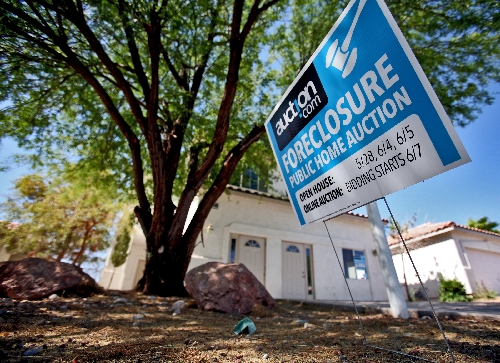Nevada said to be U.S. foreclosure sales leader
WASHINGTON -- Across the United States, foreclosure sales accounted for nearly one out of three of all home sales in the spring.
But in Nevada, they accounted for nearly two out of three transactions, a new report shows.
Nationwide, foreclosure sales, which include homes purchased after they received a notice of default or were repossessed by lenders, accounted for 31 percent of the market in the April-June quarter, Irvine, Calif.-based foreclosure listing firm RealtyTrac Inc. said Thursday.
Nevada led all states with 65 percent foreclosure sales, RealtyTrac said in its report.
However, the Greater Las Vegas Association of Realtors shows 45 percent of home sales as real estate-owned, or bank-owned. About one-fifth of sales are short sales, or lender-approved sales for less than the principal mortgage balance. Those sales can, and often do, occur after a notice of default has been filed.
Generally, about 25 percent of notice-of-default homes end up in foreclosure, association President Paul Bell said. Other possible outcomes include loan modifications, deferred payments and catching up on past arrearages.
Nationwide, the rate of foreclosures is six times the percentage of foreclosures in a healthy housing market.
The share of the market would likely have been larger this spring if not for a state and federal investigation into faulty paperwork by banks and loan servicers. The investigation has led many banks to delay foreclosure sales. Once the investigation is complete, foreclosures will likely surge later this year.
As a slice of all home purchases, foreclosure sales peaked two years ago at 37.4 percent. In the second quarter, they declined from 36 percent in the January-March period.
In all, 265,087 homes in foreclosure or owned by banks were sold in the second quarter, down 11 percent from the same period a year ago. Sales of all other types of homes also declined, according to RealtyTrac's figures, which differ from other home-sales estimates.
Bank-owned homes, which are sold after being repossessed, accounted for nearly 19 percent of all sales. That's unchanged from the previous quarter.
LV Default, a firm that tracks Las Vegas foreclosure data, reported 2,460 notices of default in July, compared with 4,761 in the same month a year ago. Of the homes that went to trustee auction, 1,526 went back to the back as REOs, 1,396 were canceled and 597 were sold to private parties, typically investors.
Banks are unloading a larger percentage of homes at trustee auctions, LV Default principal Tony Martin said. Sales to private parties compared with REOs rose to 39 percent in July from
33 percent in June and 28 percent in May, he noted.
Distressed properties, which often need repair, typically sell at big discounts and weaken prices for neighboring homes.
A bank-owned home this spring sold for 40 percent less than the average price of other homes, RealtyTrac reported. That's up from 36 percent in the previous quarter and 34 percent from the same quarter one year ago.
Homes in foreclosure or short sales went for 21 percent less than the average home sold, the firm said. That's up from an average of 17 percent in the first quarter and 14 percent in the second quarter of 2010.
The average sales price of a foreclosure property was $164,217, down less than 1 percent from the January-March quarter and nearly 5 percent from the April-June quarter in 2010, the firm said.
Las Vegas-based SalesTraq reported 2,219 real estate-owned sales in July at a median price of $97,050, and 728 short sales at a median price of $117,500.
After Nevada, Arizona foreclosure sales represented 57 percent of all home sales for the quarter, up 16 percent from a year ago. In California, foreclosure sales accounted for 51 percent of all home sales in the second quarter, virtually unchanged from last year.
Several other states had foreclosure sales that accounted for at least one-third of all home sales in the first quarter: Michigan, Colorado, Florida, Illinois and Oregon.
Las Vegas Review-Journal writer Hubble Smith contributed to this report.






















